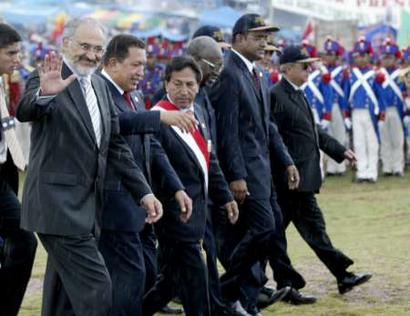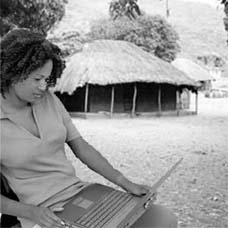
The new South American Community - which Peruvian president Alejandro Toledo described as a country - has been born in Cuzco, Peru, with the purpose of achieving economic, political, commercial and energy integration
A dream with many hurdles
By Alberto Souviron
BBC News business reporter
Caption: (L-R) Presidents Carlos Mesa of Bolivia, Hugo Chavez of Venezuela, Alejandro Toledo of Peru, Runaldo Ronald Venetiaan of Surinam and Bharrat Jagdeo of Guyana review honor guards at the historical site of 'Pampa de la Quinua' in Ayacucho, December 9, 2004. The leaders signed an accord on the eve of the anniversary of an 1824 battle in Peru, at which troops loyal to independence hero Simon Bolivar sealed the end of Spanish rule and looked towards the unification of South America. The leaders proclaimed the birth of the South American Community of Nations, which officials say will give them more trade clout and could one day lead to a shared parliament and single currency. REUTERS/Martin Alvarado
When South American leaders agreed the creation of the most important political and economic bloc in Latin America, they felt that the dreams of the nation builders of most countries in the region, Simon Bolivar and Jose de San Martin, were coming true.
The new South American Community - which Peruvian president Alejandro Toledo described as a country - has been born in Cuzco, Peru, with the purpose of achieving economic, political, commercial and energy integration.
Its leaders have said they want to emulate the European Union and give peace, development and prosperity to the 361 million inhabitants of this new entity.
But much work remains to be done if the dream of a better future is to become reality.
Challenges
The Community's leaders put their hopes on the huge potential of the region, with a GDP of $973bn and exports of $181bn.
The new community also represents - in geographical terms - 45% of the American continent, has about 25% of global water reserves, about eight million square kilometres of forests and huge reserves of oil and gas.
But this is the sunny side. The other side shows a region with a huge incidence of poverty. More than 40% of the inhabitants of the South American Community live below the poverty line.
MEMBERS OF THE SOUTH AMERICAN COMMUNITY
Argentina
Bolivia
Brazil
Chile
Colombia
Ecuador
Guyana
Paraguay
Peru
Surinam
Uruguay
Venezuela
The group has also been born with an external debt of more than $300bn and many of its members are still trying to emerge from financial crisis.
It has poor infrastructure, especially in roads, and the political process is still very unstable in some countries.
Gaining strength
But supporters of the group believe that only with a community like this would it be possible to overcome all these hurdles.
They argue that a united South America could better face the challenges of globalisation and will have a more substantial international presence.
Using the existing financial institutions, the leaders of the group are planning deeper integration of energy and transport networks.
In fact they have identified - through the Initiative for the Integration of Regional Infrastructure of South America (IIRSA) - 31 infrastructure projects to be executed between 2005 and 2010, with a cost of $4,316bn.
But probably the biggest challenge here will be supervision of these projects to avoid corruption or excess bureaucracy.
Commitment
Within these hopes and fears, everybody agrees that the key to success will be the commitment of the group's members.
Demonstrators bang on the door of a bank in Buenos Aires in 2002
Many of the bloc's members are still emerging from financial crisis
Unity has always been a problem in South America, and many analysts fear that there will be no exception here. For example, they note that only eight of the 12 presidents have attended the Cuzco Summit to sign the constitution of the new political and economic bloc.
Some note that inside the group they even cannot agree on an external common tariff.
This is why Argentine former president Eduardo Duhalde said leaders of the region chose - contrary to the EU - first to set up political union and then to advance on tariffs and economic policies.
This could be seen as an admission of how difficult it will be to achieve the integration dreams of Bolivar and San Martin.
And even more difficult will be the achievement of aims such as a common currency or a coordinated economic policy, especially with countries whose economies are strongly linked to the US dollar and still dependent on external factors.
Historical differences such as the territorial dispute between Chile and Bolivia will alse be difficult to overcome.
The first step is done and now there is a lot of work to do.
Allan Wagner, secretary general of the Andean Community, has talked of at least 15 years before we see a different reality in South America. He is one of the optimists.







